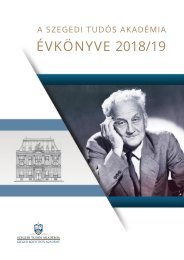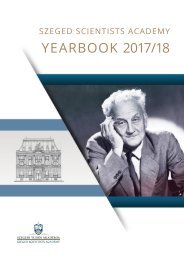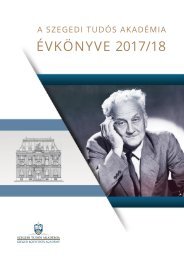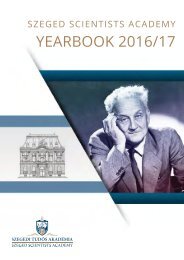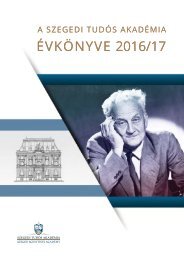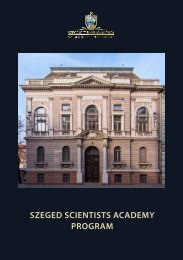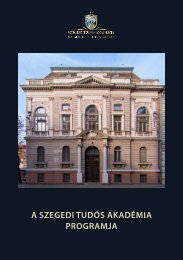Create successful ePaper yourself
Turn your PDF publications into a flip-book with our unique Google optimized e-Paper software.
SZENT-GYÖRGYI STUDENTS<br />
ZSÓFIA EDIT TÓTH<br />
Szeged Scientists Academy, 3 rd year<br />
University of Szeged,<br />
Faculty of Science and Informatics,<br />
Biology, 3 rd year<br />
YEAR OF BIRTH:<br />
<strong>19</strong>98<br />
FORMER<br />
SZENT-GYÖRGYI<br />
PUPIL:<br />
yes<br />
SZENT-GYÖRGYI<br />
MENTOR:<br />
Attila Gácser<br />
SPECIALIZATION:<br />
immunology<br />
SECONDARY<br />
SCHOOL:<br />
Radnóti Miklós<br />
Experimental Grammar<br />
School, Szeged<br />
NAME OF TEACHER:<br />
Sándor Bán<br />
LANGUAGES:<br />
English/advanced<br />
Spanish/basic<br />
IMPORTANCE, AIMS AND POSSIBLE OUTCOME OF RESEARCH<br />
Importance, aims and possible outcome of research:<br />
Members of the genus Candida are the most common opportunistic human pathogenic<br />
fungal species that cause nosocomial infections. Although C. albicans is the most common<br />
cause of candidiasis and thus, the most investigated, the number of infections caused by<br />
other Candida species is also rising since the last decade. Host responses, enabling an<br />
effective clearance of these fungi, originate from the combination of innate and adaptive<br />
immune responses.<br />
Nowadays, we have a wide range of information about the innate immune system’s<br />
responses to the presence of C. albicans and C. parapsilosis. Based on these, the<br />
fundamental difference between these two species is that unlike C. albicans, C. parapsilosis<br />
does not induce strong inflammatory responses. Our laboratory’s previous results suggest<br />
that C. parapsilosis, instead of inducing an inflammatory response, may trigger some<br />
kind of tolerogenic reaction. This conclusion was drawn from the fact, that this species’<br />
interaction with human mononuclear cells from peripheral blood (PBMCs) resulted in a<br />
cytokine response indicating Th2 polarization, instead of Th1 and Th17 differentiation, a<br />
response characteristics of fungal infections (especially those caused by C. albicans).<br />
In our present work, we aim to examine how C. parapsilosis influences the adaptive immune<br />
response of the host, compared to C. albicans. During this process, purified epitopes<br />
specific for these species are used to investigate Th1, Th17, Th2 and T-reg polarization of<br />
T-cell populations, the induced humoral immune responses and transcriptomic changes<br />
in host cells.<br />
AMBITIONS AND CAREER GOALS<br />
After finishing the BsC and Msc programme I would like to get my PhD degree. As<br />
a researcher I would like to contribute to the development of medicalbiology and<br />
immunology.<br />
HONORS AND PRIZES<br />
• 2012 - Kitaibel Pál Biology Competition - 17 th place<br />
• 2013 - Árokszállásy Zoltán Biology Competition -18 th place<br />
• 2016 - National Student Competition Assays 33 rd place<br />
PUBLICATIONS<br />
–<br />
130






